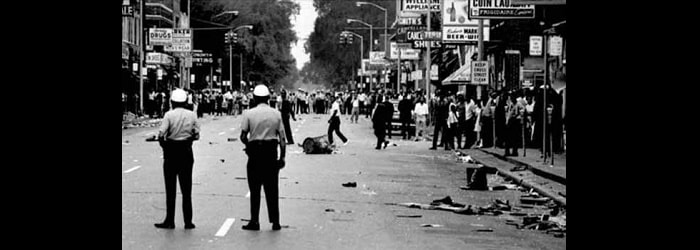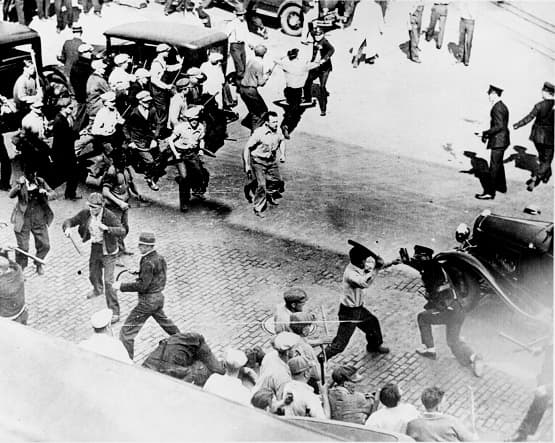Change is Violent

Chances are you never saw it. It could have been one of the most profound and revolutionary political statements of the decade, but it was glossed over by the media and died a quick death, unnoticed by most of the public. Why? Because it happened on Huffpost Live, it's dangerous, and it was said by a comedian.
Here's a link to the exchange on the show. It's 3 minutes long, watch it. Now when I say "exchange", what I really meant was Ari Shaffir bringing up an obvious truth and the show's host taken aback and absolutely flabbergasted that someone would ever say this on a live broadcast. He didn't address it, tried to awkwardly laugh it off, and ended the interview VERY quickly. I suppose he was expecting Ari to go into a bit instead of actually talking about politics on a political show.
It would seem odd that this man:

would be the only one to ever publicly address the reality of political revolution, though it's not as odd as it sounds. It's well known that many medieval and earlier kings and emperors would keep a jester or comedian of sorts around who could tell the monarch biting truths without getting themselves killed. We forgive the things they say and laugh awkwardly because it came from a comedian. He was just joking right? Watch the video and ask yourself if Ari was joking.
All that aside, he was right, and most people don't want to hear it. Your vote does nothing. In most states it doesn't matter how you vote at all. If you live in Texas or Mississippi, stay home on election day. You live in red states and all of your electoral votes will go to the republican candidate. The same goes for California and Massachusetts. Stay home. You live in solidly blue states and all of your electoral votes will go to the democratic candidate. In fact, the only states where it actually matters if you vote at all are the few "battleground states" in the mid-west where the vote is close enough that the state could swing either way. It's this "winner take all" system of electoral votes that makes the whole game pointless. Our elections, in actuality, are decided by 5 or so states while the rest of the country is written off as "same as always".
When a winner is finally declared, the promises the new president does keep are ones made to their supporters. Politicians don't care at all about the people who didn't vote for them and with the country pretty evenly split these days, each election has almost half of the country disenfranchised and unrepresented. They respond with an anger vote in the senate and house as they did swinging left during Bush's term, and right during Obama's term so that congress is at odds with the president and nothing at all gets accomplished aside from the things they all can agree on like raises and vacations.
Any tangible change for the better, for any group of people, has NEVER come out of a ballot box. It almost always comes through violence and while we have many examples of peaceful movements and revolutions, they always have a contemporary counterpart that was violent and got the actual work done. The labor movements of the industrial age weren't just protests and picket lines. They were marked by repeated clashes between workers and corporate goons with clubs.

Martin Luther King preached nonviolent protest yet the civil rights movement was also greatly affected by people like Malcolm X and the Black Panthers. In the end it was the violence toward peaceful black protestors and his own assassination that had the greatest impact on the movement when it was proven for everyone watching at home why we even needed the protest in the first place. The images of firehoses being used on children, and the hateful attacks on sit-in protesters showed alot of America that we really had a problem.
Gandhi preached nonviolent protest as well yet it was the same violence done to his followers that propelled his own movement forward and won him the hearts and minds of the people. His supporters were ready to die for the cause and went to places and did things where they KNEW they would be beaten. They used violence to achieve their goals, but they never engaged in it themselves. It's this central theme of violence that always seems to be necessary for real change to happen, whether it comes from the revolutionaries or the oppressors.
The problem with most peaceful protests is that they're largely ignored. Nobody cares, people drive right by, or they become angry when a protest hinders their mobility. Standing on the street or marching around with a sign has never accomplished much on it's own. It's only when you set something on fire that people's eyes focus, they wake up, and start asking "what's going on?". Would anyone have cared about the systemic racism and corruption of the Ferguson police department if the protestors hadn't broken some things and started some fires? Would anyone have even known who Freddie Gray was, never mind that he died if the people of Baltimore never rioted?
It's a sad truth, yet is it the truth. People talk all day. In the end, no one cares what you have to say unless you get their attention first.
Thanks for Reading the Article. PLEASE UPVOTE!!!!!!
Ari Shaffir Huffpost Live. When has a regime changed by vote?
Thanks for the post. The weekend after Independence Day, July 4th in the US, is the perfect time to reflect on what we are celebrating... An uprising of colonist against one of the mightiest army and navy of the time. The fighting and bloodshed didn't happen in some foreign land, it took place right in our backyards and streets. We now live in the land of the fee, home of the slave. The last straw for the colonist was a 2% tax on tea. We now pay almost 25% income tax in some cases and close to 10% sales tax on everything! There is a new weapon or technology at our disposal... CryptoCurrency. A non-violent way to cut off their money supply. Vote with your dollar. Support the transition out of banks and into cryptos. Don't support their systems of debt and control.